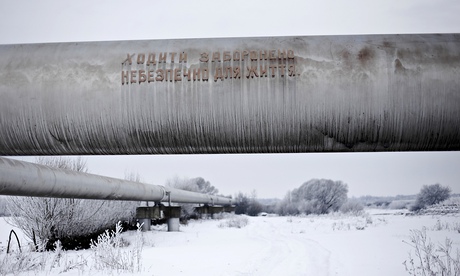Last December, Ukraine's now-deposed, pro-Moscow president Viktor Yanukovych abandoned a trade deal with the European Union in favour of closer ties with Russia. One of the sweeteners in the $20bn support package that helped persuade him was a steep discount around 30% on the price that Russia's gas giant, Gazprom, was then charging Ukraine for the natural gas on which it relies. This weekend, as relations between the two countries descended to an alarming new low, Moscow warned that the cut-price deal was unlikely to last much longer.
Gazprom, which controls nearly one-fifth of the world's gas reserves and supplies more than half of the gas Ukraine uses each year, insisted the threatened price rise merely reflected cash-strapped Ukraine's inability to meet its contractual obligations. The state-owned company said that Kiev owes it $1.55bn for gas supplied in 2013 and so far in 2014, and shows little evidence of paying up. But this is not the first time Russia has used gas exports to put pressure on its neighbour and "gas wars" between the two countries tend to be felt far beyond their borders. Russia, after all, still supplies around 30% of Europe's gas.
In late 2005, Gazprom said it planned to hike the price it charged Ukraine for natural gas from $50 per 1,000 cubic metres, to $230. The company, so important to Russia that it used to be a ministry and was once headed by the former president (and current prime minister) Dmitry Medvedev, said it simply wanted a fair market price; the move had nothing to do with Ukraine's increasingly strong ties with the European Union and Nato. Kiev, unsurprisingly, said it would not pay, and on 1 January 2006 the two countries having spectacularly failed to reach an agreement Gazprom turned off the taps.
The impact was immediate and not just in Ukraine. The country is crossed by a network of Soviet-era pipelines that carry Russian natural gas to many European Union member states and beyond; more than a quarter of the EU's total gas needs were met by Russian gas, and some 80% of it came via Ukrainian pipelines. Austria, France, Germany, Hungary, Italy and Poland soon reported gas pressure in their own pipelines was down by as much as 30%.
While it was eventually resolved through a complex deal that saw Ukraine buying gas from Russia (at full price) and Turkmenistan (at cut price) via a Swiss-registered Gazprom subsidiary, the dispute gave the EU a fit of the jitters: a compelling demonstration, Brussels said, of the dangers of becoming overdependent on one source of supply. But three years later, the same row erupted again: Gazprom demanded a price hike to $400-plus from $250, Kiev flatly refused, and on New Year's day 2009, Gazprom began pumping only enough gas to meet the needs of its customers beyond Ukraine.
Again, the consequences were marked. Inevitably, Russia accused Ukraine of siphoning off supplies meant for European customers to meet its own needs, and cut supplies completely. As sub-zero temperatures gripped the continent, several countries particularly in south-eastern Europe, almost completely dependent on supplies from Ukraine simply ran out of gas. Some closed schools and public buildings; Bulgaria shut down production in its main industrial plants; Slovakia declared a state of emergency. North-western Europe, which had built up stores of gas since 2006, was less affected but wholesale gas prices soared, a shock that was declared "utterly unacceptable" by Brussels.
So last weekend's news that Gazprom intends to start charging Ukraine around $400 per 1,000 cubic metres for its gas, as opposed to the $270-odd it has been paying since Yanukovych spurned Brussels for Moscow sparking the demonstrations that led to his downfall might seem alarming. Many industry experts, though, point out that the world has changed since 2009, and that there are any number of reasons why Moscow's natural gas supplies may not prove quite the potent economic and diplomatic weapon they once were.
For starters, we are not now in early January but in March, considered the final month of the continental European heating season, when demand is likely to be highest. Moreover, this has been a particularly mild winter the mildest since 2008 and higher than normal temperatures are forecast to continue for several weeks yet, significantly reducing demand for gas and leaving prices at their lowest for two years. Energy market analysts at the French bank Soci้t้ G้n้rale said in a briefing note last month that European gas demand in 2013 was at its lowest level since 1999. In the UK, gas consumption is currently approaching a 12-year low.
Partly as a result of weaker demand, but also because since the first "gas war" of 2006, many European countries have made huge efforts to increase their gas storage capacity and stocks are high. Some countries, such as Bulgaria, Slovakia and Moldova, which lack large storage capacity and depend heavily on gas supplies via Ukraine, would certainly suffer from any disruption in supplies. But Gas Infrastructure Europe (GIE), which represents the gas infrastucture industry, estimated that in late February European gas storage was 10 percentage points higher than this time last year and about half full; the National Grid puts Britain's stocks at about 25 percentage points above the average for the time of year.
"The conflict won't have any impact at all" on prices, a Frankfurt-based analyst told Bloomberg News. "The gas price is currently influenced by temperatures and storage levels, and both don't favour demand right now." Prices of gas for delivery next month have risen around 10%, but that reflects insecurities in the market about a possible military confrontation between Russia and Ukraine rather than worries about fundamental shortages of supply were Gazprom to turn off the taps, the analyst told the agency.
Other, structural changes have lessened the potential impact on Europe of a disruption to Russian gas supplies through Ukraine. New Gazprom pipelines via Belarus and the Baltic Sea to Germany (Nord Stream) have cut the proportion of Gazprom's Europe-bound exports that transit via Ukraine to around half the total, meaning only about 15% of Europe's gas now relies on Ukraine's pipelines. Gazprom is also planning a Black Sea pipeline (South Stream), expected in 2015, meaning its exports to Europe will bypass Ukraine completely. Ukraine itself has cut its domestic gas consumption by nearly 40% over the past few years, halving its imports from Russia in the process.
Moreover, a boom in sales of US shale gas means longstanding gas exporters such as Russia now have to fight for their share of the market. Europe is increasingly installing specialist terminals that will allow gas to be imported from countries such as Qatar in the form of liquefied natural gas while Norway's Statoil sold more gas to European countries in 2012 than Gazprom did. "Since the Russian supply cuts of 2006 and 2009, the tables have totally turned," Anders ๅslund, an energy advisor to both the Russian and Ukrainian governments, told the Washington Post.
Gazprom has no wish to see sales to Europe disrupted. At its annual meeting with investors in London on Monday, company officials were optimistic about its prospects despite a 13% fall in its share price triggered by recent events in Ukraine. Indeed, they predicted Russia's share of Europe's total gas supply would actually increase in future as overall consumption and Britain and Norway's gas production declines.
Europe accounts for around a third of Gazprom's total gas sales, and around half of Russia's total budget revenue comes from oil and gas. Moscow needs that source of revenue, and whatever Vladimir Putin's geo-political ambitions, most energy analysts seem to agree he will think twice about jeopardising it. Short of an actual war, the consensus appears to be, Europe's gas supplies are unlikely to be seriously threatened.



